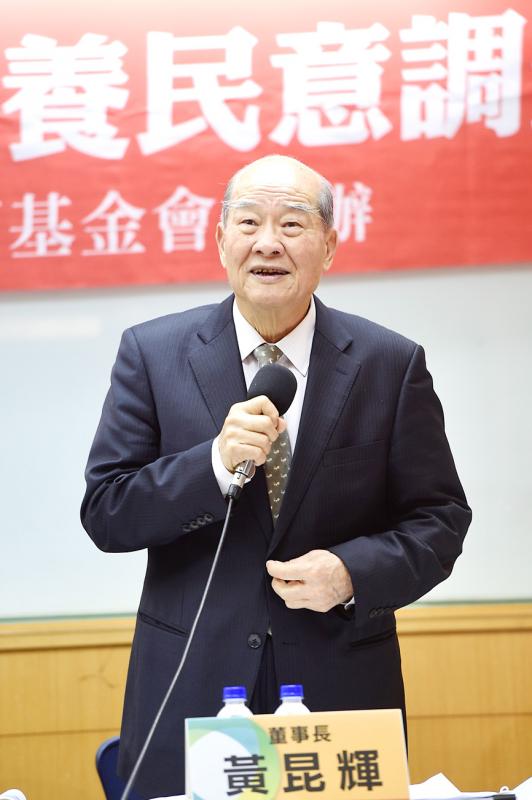A majority of respondents in a survey on civic and national consciousness said that Taiwanese generally demonstrate a sense of identification with Taiwan, the Professor Huang Kun-huei Education Foundation said yesterday.
Asked about the issue of national consciousness, 91.7 percent of respondents said that it was important for Taiwanese to cultivate a sense of identification with the history and culture of Taiwan, and 74.5 percent said they felt that Taiwanese generally demonstrated this.
The survey found that 89.1 percent said it was important for citizens to “be proud of being Taiwanese,” and 74.4 percent felt Taiwanese generally showed such behavior.

Photo: George Tsorng, Taipei Times
According to the poll, 94.5 percent of respondents felt it is important that Taiwanese “strive to fulfill their responsibilities as citizens, and to safeguard the safety and interests of the nation,” and 67.6 percent felt that Taiwanese generally met the expectation.
The survey found that 89.8 percent felt it is important for Taiwanese to see Taiwan as a sovereign nation and not part of another country, and 73.2 percent felt that Taiwanese generally demonstrated such an understanding.
“Since it began holding direct elections in 1996, Taiwan has been seen by the international community as a free, democratic nation. Taiwanese are proud of their democracy and free society,” foundation chairman Huang Kun-huei (黃昆輝) said.
However, Taiwanese still generally lack a spirit and consciousness of democracy and the rule of law, he said, adding that the issue seemed to stem from a failure to cultivate a national consciousness throughout the period of democratic reforms.
For example, survey respondents said that it was important for citizens to show concern for social issues, to distinguish between real and fabricated news, and to avoid disseminating fabricated news and disinformation, he said.
However, respondents also said that Taiwanese tend to perform the worst on these issues, he said.
The online poll surveyed 4,000 people, of which 1,848 completed the survey, foundation poll committee convener Kuo Sheng-yu (郭生玉) said.
The poll was divided into categories on several topics, including concern for social issues, the implementation of democracy and the rule of law, national consciousness, concern for environmental issues and issues related to scientific progress, he said.
“While the respondents felt that Taiwanese largely identified with a national consciousness, they also felt that Taiwanese are not living up to their responsibilities as citizens. This is worth paying attention to,” he said.

The Ministry of Economic Affairs has fined Taobao NT$1.2 million (US$36,912) for advertisements that exceed its approved business scope, requiring the Chinese e-commerce platform to make corrections in the first half of this year or its license may be revoked. Lawmakers have called for stricter enforcement of Chinese e-commerce platforms and measures to prevent China from laundering its goods through Taiwan in response to US President Donald Trump’s heavy tariffs on China. The Legislative Yuan’s Finance Committee met today to discuss policies to prevent China from dumping goods in Taiwan, inviting government agencies to report. Democratic Progressive Party Legislator Kuo Kuo-wen (郭國文) said

The Ministry of Economic Affairs has fined Taobao NT$1.2 million (US$36,900) for advertisements that exceeded its approved business scope and ordered the Chinese e-commerce platform to make corrections in the first half of this year or its license would be revoked. Lawmakers have called for stricter supervision of Chinese e-commerce platforms and more stringent measures to prevent China from laundering its goods through Taiwan as US President Donald Trump’s administration cracks down on origin laundering. The legislature’s Finance Committee yesterday met to discuss policies to prevent China from dumping goods in Taiwan, inviting government agencies to report on the matter. Democratic Progressive Party

Taiwan and its Pacific ally Tuvalu on Tuesday signed two accords aimed at facilitating bilateral cooperation on labor affairs, according to Taiwan’s Ministry of Foreign Affairs (MOFA). The governments inked two agreements in Taipei, witnessed by Foreign Minister Lin Chia-lung (林佳龍) and visiting Deputy Tuvaluan Prime Minister Panapasi Nelesone, MOFA said in a news release. According to MOFA, the agreements will facilitate cooperation on labor issues and allow the two sides to mutually recognize seafarers’ certificates and related training. Taiwan would also continue to collaborate with Tuvalu across various fields to promote economic prosperity as well as the well-being of their

Sung Chien-liang (宋建樑), who led efforts to recall Democratic Progressive Party (DPP) Legislator Lee Kun-cheng (李坤城), was released on bail of NT$80,000 today amid outcry over his decision to wear a Nazi armband to questioning the night before. Sung arrived at the New Taipei District Prosecutors’ Office for questioning in a recall petition forgery case last night wearing a red armband bearing a swastika, carrying a copy of Adolf Hitler’s Mein Kampf and giving a Nazi salute. Sung left the building at 1:15am without the armband and covering the book with his coat. Lee said today that this is a serious